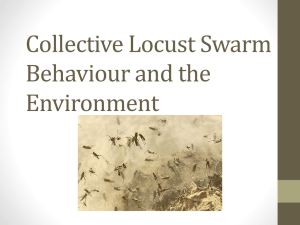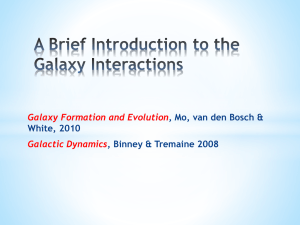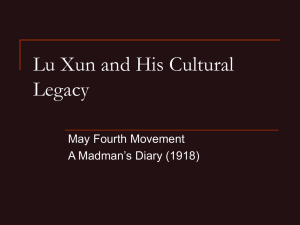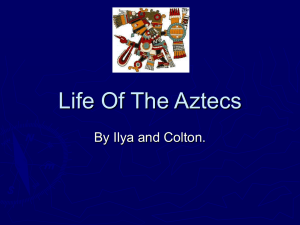Word version here
advertisement
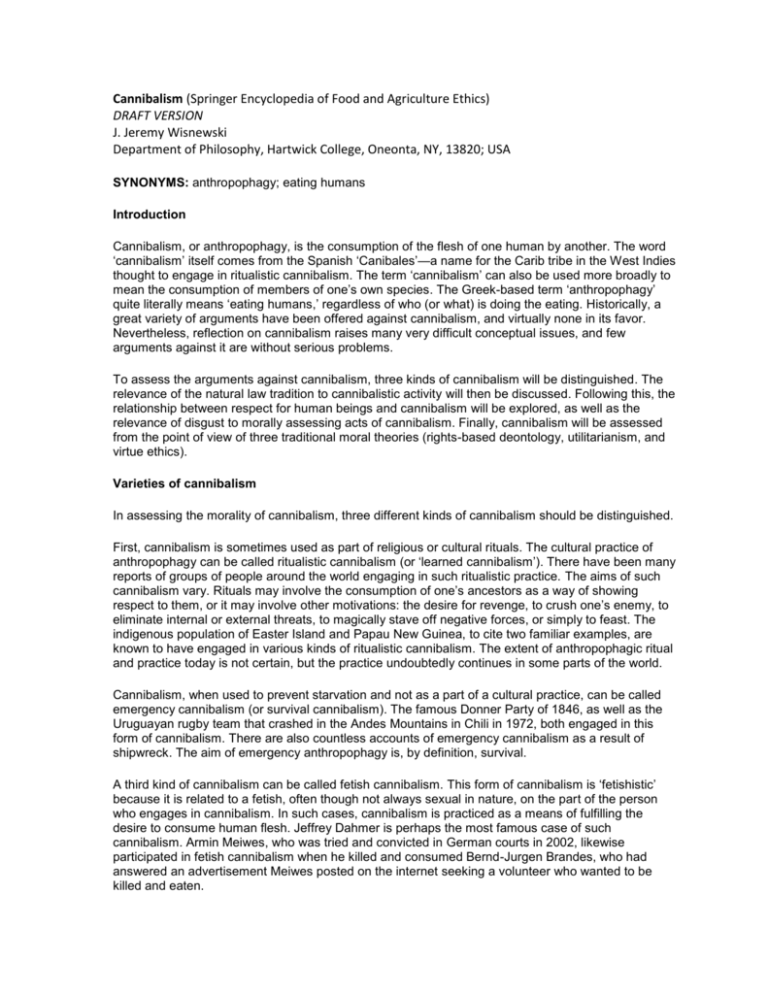
Cannibalism (Springer Encyclopedia of Food and Agriculture Ethics) DRAFT VERSION J. Jeremy Wisnewski Department of Philosophy, Hartwick College, Oneonta, NY, 13820; USA SYNONYMS: anthropophagy; eating humans Introduction Cannibalism, or anthropophagy, is the consumption of the flesh of one human by another. The word ‘cannibalism’ itself comes from the Spanish ‘Canibales’—a name for the Carib tribe in the West Indies thought to engage in ritualistic cannibalism. The term ‘cannibalism’ can also be used more broadly to mean the consumption of members of one’s own species. The Greek-based term ‘anthropophagy’ quite literally means ‘eating humans,’ regardless of who (or what) is doing the eating. Historically, a great variety of arguments have been offered against cannibalism, and virtually none in its favor. Nevertheless, reflection on cannibalism raises many very difficult conceptual issues, and few arguments against it are without serious problems. To assess the arguments against cannibalism, three kinds of cannibalism will be distinguished. The relevance of the natural law tradition to cannibalistic activity will then be discussed. Following this, the relationship between respect for human beings and cannibalism will be explored, as well as the relevance of disgust to morally assessing acts of cannibalism. Finally, cannibalism will be assessed from the point of view of three traditional moral theories (rights-based deontology, utilitarianism, and virtue ethics). Varieties of cannibalism In assessing the morality of cannibalism, three different kinds of cannibalism should be distinguished. First, cannibalism is sometimes used as part of religious or cultural rituals. The cultural practice of anthropophagy can be called ritualistic cannibalism (or ‘learned cannibalism’). There have been many reports of groups of people around the world engaging in such ritualistic practice. The aims of such cannibalism vary. Rituals may involve the consumption of one’s ancestors as a way of showing respect to them, or it may involve other motivations: the desire for revenge, to crush one’s enemy, to eliminate internal or external threats, to magically stave off negative forces, or simply to feast. The indigenous population of Easter Island and Papau New Guinea, to cite two familiar examples, are known to have engaged in various kinds of ritualistic cannibalism. The extent of anthropophagic ritual and practice today is not certain, but the practice undoubtedly continues in some parts of the world. Cannibalism, when used to prevent starvation and not as a part of a cultural practice, can be called emergency cannibalism (or survival cannibalism). The famous Donner Party of 1846, as well as the Uruguayan rugby team that crashed in the Andes Mountains in Chili in 1972, both engaged in this form of cannibalism. There are also countless accounts of emergency cannibalism as a result of shipwreck. The aim of emergency anthropophagy is, by definition, survival. A third kind of cannibalism can be called fetish cannibalism. This form of cannibalism is ‘fetishistic’ because it is related to a fetish, often though not always sexual in nature, on the part of the person who engages in cannibalism. In such cases, cannibalism is practiced as a means of fulfilling the desire to consume human flesh. Jeffrey Dahmer is perhaps the most famous case of such cannibalism. Armin Meiwes, who was tried and convicted in German courts in 2002, likewise participated in fetish cannibalism when he killed and consumed Bernd-Jurgen Brandes, who had answered an advertisement Meiwes posted on the internet seeking a volunteer who wanted to be killed and eaten. Arguments from Natural Law Discussions of natural law in the modern era (1600-1800) made frequent use of the figure of the cannibal. Discussion of cannibalism itself was widespread in the 19th-centruy, largely due to the stories of travelers who had visited places where cannibalism was alleged to occur. (Avramescu, 2009). Herman Melville’s Moby Dick provides one literary example of the much discussed figure of the cannibal. Interestingly, however, Melville presents the cannibal (the character Queequeg) as both honorable and worthy of our respect—not as a moral monster. In a similar vein, in what is perhaps the most famous essay on cannibalism, Michel de Montaigne acknowledges the immorality of cannibalism, but also insists that the practices of European nations (involving, for example, torture) are far worse. While cannibalism may well be barbarous, Montaigne argues, it is no more barbarous than the actions of the so-called ‘civilized’ world. Indeed, Montaigne suggests that it is less barbarous. Many historical reports of cannibalism are now widely regarded as unreliable. Allegations of cannibalism in centuries past were sometimes made to justify the oppression of indigenous peoples, or to secure funding to ‘civilize the savages.’ It is difficult to know the exact extent to which allegations of cannibalism among indigenous peoples reflected such motivations. Certainly, though, the amount of cannibalism alleged to exist in the world was highly exaggerated throughout the nineteenth century and into the twentieth. The central argument used against cannibalism in all its forms in the modern period relied on the concept of natural law. According to natural law theory, certain kinds of practices violate the order of the world—an order that is variously conceived as coming from some higher being (God) or as stemming from things like human nature. According to some of the standard arguments, the consumption of members of one’s own species among human beings violates this natural order, and is therefore immoral. In the modern period, the relationship between cannibalism and natural law is discussed by thinkers as diverse as Hugo Grotius (2009), Samuel Pufendorf (1991), John Locke (1997), Michel de Montaigne (1993), and Thomas Malthus (1999), to name only a few. Arguments from natural law, however, face significant objections. First, it is very difficult to determine 1) whether or not anything like ‘natural law’ actually exists, and 2) what the content of this law actually is. Indeed, cannibalism has sometimes been taken to be evidence against the existence of natural law (Avramescu, 2009). Moreover, appeals to natural law frequently articulate one’s point of view rather than providing a justification for it. This can be seen when one’s only reason for saying that something is wrong is that the thing is ‘unnatural.’ Leaving aside how we are to know what things are and are not natural (a thorny issue), it is often contended that claims about what ought to be the case do not follow from facts about what is the case. This is typically called the ‘is/ought’ problem, and can be traced back to David Hume. One cannot claim that there shouldn’t be cannibalism (an ‘ought’ claim) based on the claim that cannibalism is unnatural (an ‘is’ claim). One can even argue, however, that cannibalism is not unnatural. On one view, anything that natural biological organisms do is itself natural. If this is correct, then cannibalism is as natural as many other cultural practices—marriage, funeral rites, festivals, and so on. Some anthropologists have even argued that cannibalism was common among our evolutionary ancestors. Thus, the appeal to ‘unnaturalness’ faces two central objections: 1) something may well be morally permissible even if unnatural (this is an implication of the ‘is/ought’ distinction), and 2) cannibalism may not be unnatural. Appeals to natural law sometimes involve appeals, not to the natural order, but to the will of God. If cannibalism violates the will of God, one standard argument goes, it violates natural law. The difficulties with this view are fairly straightforward: 1) it is impossible to prove that any particular act either is or is not the will of God (there are many possible religious traditions to appeal to, and no definitive argument that one is superior to another), and 2) it is possible, in response to this line of argument, to simply deny the existence of God. Respect and Cannibalism Despite arguments against cannibalism based on the doctrine of natural law within religious traditions, many of these very same religious traditions involve at least symbolic cannibalism. The Eucharist, for example, involves the consumption of (a symbol of) the flesh and blood of Christ. One is eating the flesh of another (partial) human, at least symbolically, in communion. The roots of this practice are shared by more obviously cannibalistic traditions. Cannibalism involves literally incorporating the human being who is eaten. This is sometimes described as a means by which one pays respect to the deceased, allowing him to live on (symbolically) within the bodies of those who survive him. In this respect, ritualized cannibalism has sometimes been a means by which one honors the dead rather than a means by which to denigrate or disrespect the dead. Similarly, the Eucharist involves the internalization of Christ’s flesh as a means to symbolically make Christ a part of oneself. In the case of ritualistic cannibalism, then, it is simply not clear that there is anything intrinsically disrespectful in all anthropophagic cultural activities. If some forms of ritualistic cannibalism are not inherently disrespectful, it follows that cannibalism itself is not inherently disrespectful (that is, there is at least one kind of cannibalism that is consistent with maintaining respect for the cannibalized). In the case of emergency cannibalism, it can be argued that no disrespect is intended (though this does not guarantee that disrespect is not present). In emergency cannibalism, after all, one only consumes human flesh to avoid starvation. Nevertheless, one can certainly imagine some cases of emergency cannibalism that involve disrespecting those eaten. This indicates that the circumstances of the cannibalism will be the determining factor in deciding whether or not respect for persons has been violated. In the case of fetish cannibalism, disrespecting the person cannibalized is much more common. In most cases of this kind of anthropophagy, a person is murdered and then eaten. All cases of murder (though not necessarily all cases of killing) involve disrespecting the person murdered (one doesn’t acknowledge the person’s desire and right to live). Nevertheless, there is at least one case in which fetishistic cannibalism was contingent on the consent of the cannibalized. In the 2002 case of Armin Meiwes, Meiwes actually released one potential victim of cannibalization when the voluntary victim revoked consent. (Wisnewski, 2007). He also went to great lengths to document the consent of Bernd-Jurgen Brandes, utilizing video-taping as well as written consent prior to actually killing and eating him. If respect for persons involves requiring their consent to whatever one intends to do to them (an arguable, but nevertheless plausible, account of what respect involves), then fetish cannibalism is at least in principle consistent with respect for persons (even if in practice it is usually not). Consent and Cannibalism Some argue that consent to cannibalism mitigates any wrongdoing involved in it. Provided it is possible to consent to cannibalism, then, consent transforms an otherwise immoral act into a permissible one. One response to this argument is to claim that consent cannot be given, as only someone who is irrational would agree to be eaten. This reply, however, is circular. Fetishes are by definition irrational. It does not follow from this that one cannot consent to participate in a fetish. If one insists all cases of fetish cannibalism are illegitimate, one has simple presupposed that it is impossible to consent to cannibalism. Of course, this is the very question which is at issue in moral debates about anthropophagy (is cannibalism ever permissible?). If one begins with the assumption that cannibalism cannot be the object of consent, one cannot then claim that this assumption proves the impermissibility of cannibalism. More argument is needed (Wisnewski, 2007). Another objection that can be raised against the view that consensual cannibalism is acceptable goes as follows: any moral doctrine which concludes that cannibalism is moral must be mistaken. If an emphasis on consent has this implication, then there must be something wrong with the doctrine that consent can transform an immoral action into a moral one. If consenting can justify cannibalism, the objection runs, then it can justify anything. This by itself might be taken to indicate that consent cannot be the only measure of the moral permissibility of an action. Of course, this line of objection also takes for granted the immorality of cannibalism rather than establishing it. Arguments from Disgust The most common immediate reaction to cannibalism is to claim that the practice is disgusting. The moral relevance of an appeal to disgust, however, is hotly contested. While some philosophers argue that disgust can be morally relevant, few argue that it is always so. This means that any appeal to disgust must also rely on additional arguments if it is to make the case that disgust in regard to cannibalism demonstrates the immorality of that practice. Given that picking one’s nose is disgusting, after all, hardly entails that it is immoral. Even if we all accept that eating another human being is disgusting, then, we have not yet shown that it is also immoral, let alone that it is immoral because it is disgusting. Rights-based Arguments One argument against cannibalism states simply that cannibalism violates a duty we owe to other persons. This is sometimes captured by an appeal to the rights of other human beings. Specifying which right is violated by cannibalism, however, is a difficult task. If one claims that we have a right not to be eaten, one has simply asserted the conclusion in advance of providing evidence for it. To say that humans have a right to not be eaten is equivalent to saying that cannibalism is wrong (one cannot conclude that cannibalism is wrong simply by asserting it in alternative language). To make a case against cannibalism based on human rights, then, one must appeal to a right that is not equivalent to the right not to be cannibalized, and then show that cannibalism violates this right. There are several difficulties that must be overcome to make such a case. Murder is not cannibalism. One might accept the claim that all persons have a right to life, and thus conclude that any killing for the purpose of cannibalism violates this right to life, while also maintaining that cannibalism itself does not violate this right. In other words, to kill in order to cannibalize is indeed a violation of the right to life; to cannibalize one who is already dead, however, does not violate this right. One theoretical difficulty with the appeal to rights goes as follows: some have argued that only living subjects can have rights. On this view, the dead possess no rights, as the dead, strictly speaking, do not exist. On this view, traceable to Epicurus and Lucretius, death is simply non-existence. One must exist to have rights. Therefore, the dead cannot be said to have rights. There are two plausible responses to this line of argument. First, one can argue that the dead do, in fact, have rights (or, put alternatively, that the dead can still make demands on the living). Second, one can argue that the living have rights that involve the dead, even if the dead themselves do not have rights. The claim that the dead have rights is widely enshrined in western law. We protect the wishes of the deceased by carrying out their wills; we utilize laws to govern the exhumation of human remains, presumably because we collectively regard the dead as having a right to ‘rest in peace.’ Of course, the fact that such rights are enshrined in law does not entail that they are justified. Nevertheless, such laws provide some evidence for the view that many regard the deceased as entitled to certain kinds of respect. The claim that persons have obligations regarding the dead, even if the dead have no rights, is sometimes discussed in terms of indirect duties. Because a person has property rights, for example, I have a duty to that person to refrain from destroying his or her property. In this way, I have an indirect duty to the property because I have a direct duty to the person who owns this property. Analogously, one might think I have indirect duties to the dead because I have direct duties to the living. Thus, desecrating or disrespecting corpses, on this view, would amount to violating a duty I have to living human beings—perhaps the family of the deceased, who do not want their deceased loved ones interfered with, or perhaps even to society at large. The question still remains, however, as to which right in particular is violated by cases of cannibalism. An appeal to the right to be treated with respect fails for reasons discussed above (See Respect and Cannibalism). After all, there are cases in which respect is shown by cannibalizing a person. Nevertheless, one might acknowledge that the means through which one shows respect differ across different cultures. On this view, then, showing respect will be an absolute obligation (there is a universal right to it), even though the means by which one shows respect will differ across cultures. The conclusion here must be substantially weaker—namely, that it is wrong to cannibalize only in those cases where cannibalism represents a disrespect for the dead. This conclusion, of course, is compatible with the claim that cannibalism is not universally wrong. One might similarly argue that cannibalism violates a central principle of deontology, the ethics of duty. In one of its most famous formulations, duty requires that we treat human beings “as ends and never merely as means” (Kant). To eat another human being, on this view, involves treating that person as a means (food) to a particular end (nourishment), and hence cannot be defended. Two substantial problems can be raised against this deontological argument, however. First, one might argue that the right to be treated as an end (and not a mere means) does not extend beyond the grave. That is, one might argue that we only have a duty to respect the living. If this is correct, the above argument fails in the case of cannibalism, despite the fact that the duty holds among the living. More persuasively, one can point to ritualistic cannibalism as an example of respecting the dead (at least in those cases where it is used for this purpose). This seems to indicate that respect for persons, alive or dead, is compatible with at least some kinds of cannibalism, and hence that cannibalism does not necessarily involve the absence of respectful treatment. An appeal to universal rights not to be cannibalized has some unexpected consequences. In a strict case of emergency cannibalism, for example, an absolute and universal right against cannibalism entails that starving to death is morally required. Many people find this result counter-intuitive. An emergency situation, by its very nature, is exceptional. Moreover, one might argue that certain otherwise immoral actions are permitted when these actions are necessary for life-preservation. These concessions entail, however, that the prohibition against cannibalism cannot be absolute. Once we grant that there are some conditions under which cannibalism is acceptable, we grant that the range of permissible cases may be wider than we initially suspected. Utilitarian Arguments Utilitarianism is the view that actions are right or wrong in virtue of the consequences they produce, where we measure the consequences of an action in terms of some pre-defined good (pleasure, happiness, interests, preferences, etc). Utilitarian arguments can also be given against cannibalism. Before considering these arguments, one should distinguish between those arguments that aim to show it would be immoral to legalize cannibalism (a policy question) and those arguments for the view that any individual act of cannibalism is immoral. Utilitarian consideration can arguably establish the first claim; they fall substantially short of the second. On the policy side of the issue, one might argue that allowing (or encouraging) cannibalism will shape the way individuals within a society understand their fellow human beings. If we come to see one another as a source of food, this argument goes, we will have a fundamentally diminished view of other persons, and the consequences of this will be both far-reaching and dire. Because a healthy society must cultivate and maintain mutual respect among its citizens, accepting cannibalism when it occurs violates utilitarian principles. Ultimately, accepting cannibalism will diminish the well-being of every member of the society that practices it. Further, one might argue that a society in which the dead are not permitted to ‘rest in peace’ would create anxiety among the living regarding what may befall their mortal remains. An increase in this anxiety, it might be argued, would thus produce more pain than pleasure (and hence should be rejected on utilitarian grounds). Of course, the utilitarian must consider both short-term and long-term consequences. Given that there have been cannibalistic societies where the above argument does not seem to hold, one can respond to the above argument by pointing out that there is no necessary connection between anthropophagy and viewing persons as having diminished worth. After a few generations, the shock of cannibalism may no longer cause the kind of adverse reactions we currently associate with it. Nevertheless, this hardly entails that we have any reason whatsoever to pursue cannibalism at the level of social policy. As a policy question, then, utilitarian considerations seem to indicate that nothing speaks in favor of allowing cannibalistic practices. The same arguments cannot be made, however, when applied to individual cases. In fact, utilitarian considerations would seem to justify cannibalism in emergency situations. In such a case, the initial revulsion one faces is outweighed by the desire to avoid death and starvation. Moreover, even if we maintain that the dead person cannibalized has a postmortem interest in not being eaten, this interest would seem to be outweighed by the need to save lives. (This argument in favor of emergency cannibalism presumes that the person cannibalized is already dead. The view that we should kill someone in order to eat them, even in emergency situations, is a much more controversial matter.) Evolution and Cannibalism A roughly utilitarian argument is sometimes made from the point of view of evolution. If humans eat one another, the argument goes, the species as a whole will not benefit. There is some evidence that human consumption of human flesh increases the likelihood of Kruezfeld-Jakob Syndrome, a disease which attacks the central nervous system, and which results from a build-up of prion proteins. Prions are spontaneously generated in humans even absent any cannibalism, though the consumption of human flesh containing prions increases the likelihood that one will acquire the disease. Virtue Ethics and Cannibalism A virtue ethics aims to identify and cultivate particular virtues within individual human beings. Virtues are dispositions, or states of character, that are conducive to human excellence and flourishing. To argue against the consumption of human beings from within a tradition of virtue ethics, one would need to show that those traits that lead to anthropophagy are themselves not consistent with, or at least not conducive to, the virtuous life. However, simply asserting that cannibalism is not virtuous is not an argument, as it presupposes the very thing it attempts to establish. To prevent arguing circularly, one must establish some specific trait or virtue that is violated by the practice. For example, one might argue that engaging in cannibalism makes it easier to view a person as a thing, and that viewing persons in such a way is not part of the virtuous life. Such arguments, however, face the same obstacles we find in other cases: there have been societies that routinely engaged in ritualistic cannibalism, and some forms of ritualistic cannibalism do not seem to involve treating the cannibalized as a mere thing. Indeed, in at least some ritualistic cannibalism, the body of the cannibalized is regarded with a kind of reverence. While it is certainly possible that these cultures were engaging in practices incompatible with virtue, more argument is required to establish this. To insist that these cultural practices are illegitimate without providing such an argument may well be ethnocentric. Summary There are arguments against eating humans from virtually every major ethical tradition, as well as from the majority of religious traditions. These arguments, however, rarely (if ever) cover every kind of cannibalism, and all face serious objections. The absence of arguments establishing a universal prohibition of cannibalism is not equivalent to the claim that cannibalism is morally permissible. It may be permissible in certain cases, but such cases will have to be assessed individually. Further Reading 1. Aristotle. (1980). Nicomachean Ethics. Oxford: Oxford University Press. 2. Askenasy, Hans. (1994). Cannibalism: from Sacrifice to Survival. Amherst: Prometheus Books. 3. Avramescu, Catalin. (2003). An Intellectual History of Cannibalism. Translated by Alistair Ian Blyth. Princeton: Princeton University Press. 4. Grotius, Hugo. (2009). The Rights of War and Peace: Including the Law of Nature and of Nations. Ithaca: Cornell University Library. 5. Kant, Immanuel. (1999). Practical Philosophy. Cambridge: Cambridge University Press 6. Locke, John. (1997). Political Essays. Cambridge: Cambridge University Press. 7. Malthus, Thomas. (1999). An Essay on the Principle of Population. Oxford: Oxford University Press. 8. Mill, John Stuart. (2002) Utilitarianism. New York: Hackett Press. 9. Montaigne, Michel. (1993). The Complete Essays. New York: Penguin. 10. Pufendorf, Samuel. (1991). On the Duty of Man and Citizen according to Natural Law. Cambridge: Cambridge University Press. 11. Wisnewski, J. Jeremy. (2004). A Defense of Cannibalism. Public Affairs Quarterly, 18:3, 265272. 12. Wisnewski, J. Jeremy. (2007). Murder, Cannibalism, and Indirect Suicide: A Philosophical Study of a Recent Case. Philosophy in the Contemporary World, 14:1, 11-21.

